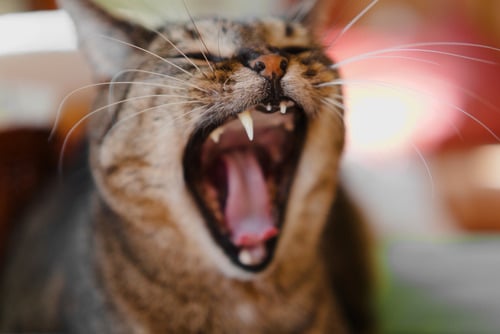Occasionally, a cat might lose a tooth, which can be concerning for pet owners. In this blog, we’ll explore what to do if your cat’s tooth fell out, why it might happen, and when to seek professional help. If you’re in Locust Grove, GA, and need immediate assistance, call Woodland Animal Hospital at (770) 467-3140 or request an appointment online.
Why a Cat’s Tooth Might Fall Out
Tooth loss in cats can occur due to several reasons, ranging from natural processes to underlying health issues. Understanding these causes can help you identify the best course of action for your pet.
- Natural Aging: Just like humans, cats can lose teeth as they age. Older cats may experience tooth loss as part of the natural aging process.
- Dental Disease: Periodontal disease is a common cause of tooth loss in cats. This condition affects the gums and supporting structures of the teeth, leading to loosening and eventual loss.
- Trauma: Accidents, such as falls or fights with other animals, can result in a tooth being knocked out.
- Resorptive Lesions: These are painful dental conditions where the tooth structure breaks down and is absorbed by the body, often leading to tooth loss.
- Genetic Factors: Some cats may be more prone to dental issues due to their genetic makeup.
Signs of Dental Issues
Recognizing the signs of dental problems early can prevent further complications. Symptoms to watch for include:
- Bad breath
- Excessive drooling
- Difficulty eating
- Pawing at the mouth
- Broken, discolored, or missing teeth
Immediate Steps to Take If Your Cat’s Tooth Fell Out
Assessing the Situation
If you notice that your cat’s tooth has fallen out, stay calm and gently check your cat’s mouth to see if there are any other loose teeth or signs of injury. Be cautious, as your cat may be in pain.
Note any signs of swelling, bleeding, or other symptoms that could indicate a more serious issue. If possible, find the lost tooth and keep it. It may be helpful for your veterinarian to examine it.
Contacting Your Veterinarian
After assessing the situation, it’s essential to contact your veterinarian for advice and potential treatment. Reach out to Woodland Animal Hospital at (770) 467-3140 to discuss your cat’s condition and determine the urgency of the situation. Provide detailed information about your cat’s symptoms and the circumstances of the tooth loss. Depending on the severity, you may need to bring your cat in for an examination and treatment.
Professional Dental Care and Treatment Options
A thorough dental examination by a veterinarian is crucial to identify any underlying issues and determine the appropriate treatment. Your vet will inspect your cat’s mouth for any signs of disease or injury. Dental X-rays may be necessary to assess the health of the remaining teeth and jawbone and blood tests may be conducted to check for systemic conditions affecting dental health.
Treatment Options
Based on the examination results, your veterinarian may recommend various treatments:
- Dental Cleaning: A professional cleaning can remove plaque and tartar, helping to prevent further tooth loss.
- Medication: Antibiotics or pain relief medications may be prescribed if there is an infection or significant discomfort.
- Tooth Extraction: If other teeth are damaged or diseased, extraction might be necessary to prevent further complications.
How to Prevent Your Cat’s Tooth Loss
To maintain your cat’s dental health and prevent future tooth loss, consider these preventive measures:
- Routine Check-ups: Schedule regular veterinary check-ups to monitor and maintain your cat’s dental health.
- Dental Hygiene at Home: Brush your cat’s teeth regularly using cat-specific toothpaste and dental tools.
- Balanced Diet: Provide a balanced diet that supports dental health. Some cat foods are specifically formulated to reduce plaque and tartar buildup.
Monitoring Your Cat’s Recovery and Health
After receiving professional care, it’s important to monitor your cat’s recovery and overall dental health. Attend any scheduled follow-up appointments at Woodland Animal Hospital to ensure your cat is healing properly. Continue with any home care recommendations provided by your veterinarian for the duration of your cat’s recovery.
Observing for Recurring Issues
Stay vigilant for any recurring signs of dental problems and act promptly if they arise. Watch for any changes in eating habits, grooming, or overall behavior that might indicate discomfort. Regularly inspect your cat’s mouth for signs of dental issues, even if they appear healthy.
Supporting Your Cat’s Dental Health in the Long Term
Maintaining your cat’s dental health is an ongoing process that requires diligence and regular care. Establish and maintain a consistent dental care routine at home. Schedule periodic professional cleanings as recommended by your veterinarian. Stay informed about the best practices for feline dental health through reputable resources and veterinary advice. If your cat’s tooth fell out, contact Woodland Animal Hospital at (770) 467-3140 or request an appointment online for professional advice and care.




